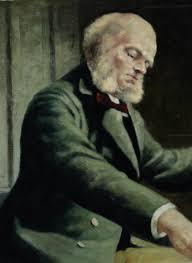About music (CWMCE - Questions And Answers Volume 03 - 28 July 1929)

Among the great modern musicians there have been several whose consciousness, when they created, came into touch with a higher consciousness. César Franck played on the organ as one inspired; he had an opening into the psychic life and he was conscious of it and to a great extent expressed it. Beethoven, when he composed the Ninth Symphony, had the vision of an opening into a higher world and of the descent of a higher world into this earthly plane. Wagner had strong and powerful intimations of the occult world; he had the instinct of occultism and the sense of the occult and through it he received his greatest inspirations. But he worked mainly on the vital level and his mind came in constantly to interfere and mechanised his inspiration. His work for the greater part is too mixed, too often obscure and heavy, although powerful. But when he could cross the vital and the mental levels and reach a higher world, some of the glimpses he had were of an exceptional beauty, as in Parsifal, in some parts of Tristan and Iseult and most in its last great Act.
There is a domain far above the mind which we could call the world of Harmony and, if you can reach there, you will find the root of all harmony that has been manifested in whatever form upon earth. For instance, there is a certain line of music, consisting of a few supreme notes, that was behind the productions of two artists who came one after another – one a concerto of Bach, another a concerto of Beethoven. The two are not alike on paper and differ to the outward ear, but in their essence they are the same. One and the same vibration of consciousness, one wave of significant harmony touched both these artists. Beethoven caught a larger part, but in him it was more mixed with the inventions and interpolations of his mind; Bach received less, but what he seized of it was purer. The vibration was that of the victorious emergence of consciousness, consciousness tearing itself out of the womb of unconsciousness in a triumphant uprising and birth.
CWMCE - Questions And Answers Volume 03 - 28 July 1929 (excerpts)
Diego Innocenzi performs César Franck's Offertoire en mi-bemol majeur on the famous
Aristide Cavaillé-Coll organ of St.François-de Sales, Lyon, France.
